Campaign Contributions as Free Speech
A recent Gallup poll shows that the American public agrees with the Supreme Court that campaign contributions are free speech but that most nonetheless want to limit said speech.
Fifty-seven percent of Americans consider campaign donations to be a protected form of free speech, and 55% say corporate and union donations should be treated the same way under the law as donations from individuals are. At the same time, the majority think it is more important to limit campaign donations than to protect this free-speech right.
Interestingly, Democrats and Republicans overwhelmingly agree that money = speech; it’s Independents who are bringing the numbers down.
Apparently, however, Americans don’t really value free speech all that highly.
More specifically, 61% of Americans think the government should be able to limit the amount of money individuals can contribute to candidates and 76% think it should be able to limit the amount corporations or unions can give.
Again, this polling was conducted at the time that the arguments were being heard before the Court. The debate since the ruling may have changed people’s minds on an issue that many have doubtless not seriously considered. Still, Gallup’s Lydia Saad (a family friend) is likely right:
Thus, it would appear that, regardless of Americans’ support for the principle that campaign donations are a form of political speech, and that corporations and unions should get the same treatment as individuals, they are likely to have significant concerns about the practical effect of the court’s ruling, that is, more corporate and union money being poured into elections.
Which, really, isn’t surprising. After all, Congress passed the law that was overturned quite recently.
Still, it’s a shame that people are willing to sacrifice what they correctly identify as “free speech” in order to level the playing field. As Will Wilkinson observes,
I have to say I was taken aback by the vehemence with which people I like and admire have insisted that the state must selectively silence political speech. I didn’t realize that this was such a profound point of disagreement. As I see it, these regulations have accomplished very little other than to protect the interests of powerful, entrenched incumbent politicians against public criticism.
[…]
I see this ruling as vindicating the importance of equality of voice by protecting the rights of individuals and associations to speak out on behalf of their interests and values. Progressives clearly see the ruling primarily as some kind of corporate-empowerment initiative. But you can’t really take on Big Agra or Wall Street unless you can organize to speak out against the Chuck Grassleys and Chuck Schumers when it really counts.
Exactly right. Aside from the sheer freedom issue, the practical effect of limiting money in politics is to further increase the power of incumbency. Without massive amounts of money for organizing and advertising, it’s virtually impossible for a non-celebrity candidate to oust an established Representative or Senator.
Tim Lee also makes several salient points in a post well worth reading in full. This is especially key:
Even if you think it’s appropriate for Congress to regulate the speech of Exxon-Mobil and Pfizer, I think it’s awfully hard to square the First Amendment with a law that limits the ability of NARAL or the NRA to advocate for its members’ views.
[…]
So I’m not thrilled at the idea of Fortune 500 companies spending more money on bogus “issue ads.” But I think the dangers of such ads are frequently exaggerated. I’m far more worried about preserving the right of organizations like the ACLU to spread their message. And I don’t see any plausible way to stop the former without seriously restricting the latter. So I’m glad to see the Supreme Court take the words of the First Amendment—”Congress shall make no law”—literally.
Indeed. The ruling will no doubt lead to more speech that I find annoying. But that’s precisely the kind of speech that most needs protection.
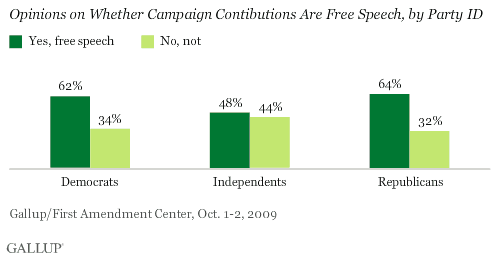
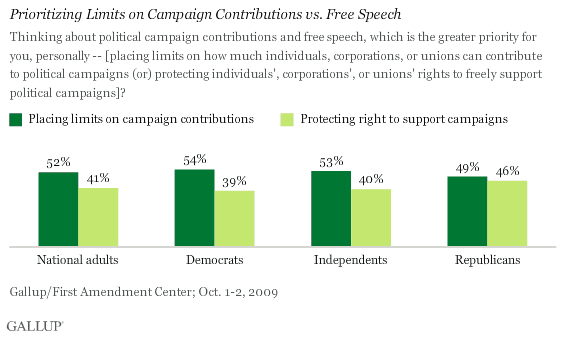


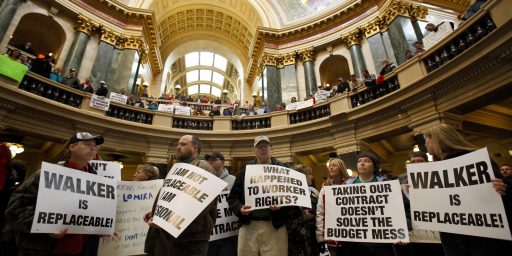
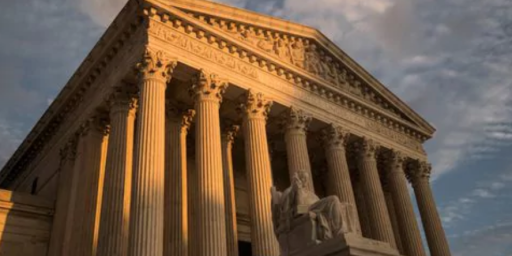
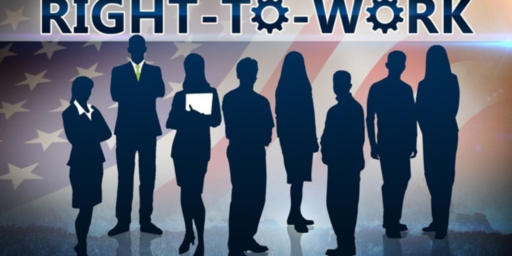
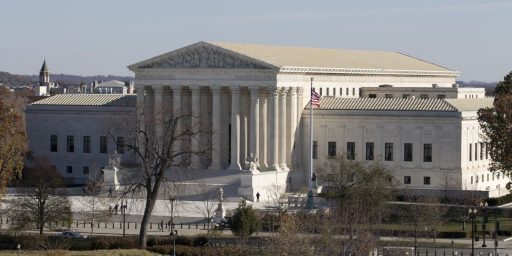
Right. Maybe my initial reaction to the ruling was over-heated. I was thinking about it (my reaction) and I thought of a cartoon I saw in Playboy years ago. It was a series of panels about a father’s perceptions of his daughter’s first date.
First panel: Nicely dressed young man holding flowers at front door of young girl’s house for first date.
Second panel: Nicely dressed young man has changed into a not-so nicely dressed young man.
Third panel: Not-so nicely dressed young man has changed into a greasy looking thug.
Fourth panel: Greasy looking thug has changed into a hulking biker with his hand up the daughter’s dress as the couple goes out the front door.
As I say, I’m pretty sure my initial reaction was overblown.
Five words: AFT, NEA, SEIU, UAW e AFL-CIO.
These are the guys that are going to use that, not corporations.
Andre – they already do – now they can just give more money that is claimed/legit.
I personally place campaign contributions to a candidate in a whole ‘nother box than other spending on money.
In my state, until at least recently, a politician could retire from public life and withdraw unused campaign money for his personal use. Adding the ways this money can be used by a politician for his personal or professional benefit anyway, these campaign contributions resemble bribes.
The difference with G.E. running an ad to persuade the voters to vote for Candidate X is that at the worst G.E. is trying to coerce the voters, instead of the politician. I trust the voters more.
other spending on money = other political spending
I don’t think it’s the end of the world, but it was a deeply clueless decision made by right-wing judicial activists who overturned settled law for the sake of ideology.
We need to all stop pretending that the court isn’t divided by parties. There’s a Republican court and a Democratic court, and all the rest is window-dressing. The Roberts court wanted a solution that would benefit their ideological brothers and they got it.
And no one yet has given me a satisfactory answer to the issue of US corporations helmed or owned by non-Americans. Evidently as long as you’re a rich foreigner you do get to vote in US elections — and you get to vote with all the money you care to spend.
The core idea — that corporations are persons — is absurd. And it results in a Colombian or Indian or Chinese CEO having the ability to use a corporation to pour millions into direct intervention in the US electoral process.
You might think Republicans would object. But so long as the result serves big business I guess they’re willing to put their xenophobia aside.
I think the ruling is also suffering from timing. I’m in favor of HCR, but this is one of those issues that I’m often on the fence over. My sense, just in reading blogs and talking to media-type lefty friends, is that this ruling came at a bad time for so-called progressives. Straw to broken back sort of deal. Obama supports are generally frustrated right now on multiple levels, and now a lot of them think Pepsi and Haliburton are going to be running for their Congressional seat.
Just a bad week, really. I wouldn’t expect much sobriety of analysis, and James, as you noted, I would think these numbers would be all over the place post-ruling if the poll were conducted today.
“Five words: AFT, NEA, SEIU, UAW e AFL-CIO.
These are the guys that are going to use that, not corporations.”
They dont have as much money as corporations.
We are talking about an American public which watches American Idol, so I am not sure we should be looking to them for great wisdom, but I think they sense a big problem here. Giving corporations free speech really means letting a few execs and the board use corporate money for political speech. The guy in the IT department is not going to have his opinions expressed. This, coupled with the concentration of wealth at the top of the income bracket, means that we risk establishing an aristocracy.
Before this ruling, those same execs and board members could engage in political speech and spend on ads or donations, but they had to use their own money. Could they end around the system? Yes, but in fact they did not do it all that much. The MIT paper cited by Cowen recently (cant link on this computer) showed that most contributions are individual and that there is a lot less money in the system than people think. I predict this will change that dynamic.
This really means executives get to have their cake and eat it also. They are shielded from personal liability by the laws of incorporation, and they get to use corporate money to advance their pet political causes.
Steve
but steve, corporations are already getting taxed without representation!!! I think the corporate form offers certain advantages and imposes some additional costs on the government, so taxing them is justified. But I don’t think political speech is one of them. Too risky.
michael, the ideological difference is as always stong on the court, but it’s also interesting to notice that the sides have shifted. In the 1970s it was the liberals that viewed speech as speech, and whether its speaker was a corporation was irrelevant. It was law-and-order types like Rehnquist that argued that corporations do not have political speech rights.
People often ask where the civil libertarian wing of the conservative movement is. Well, according to the standards of the cold war era, the conservatives on the court are civil libertarians.
I have never cared for polls. This is pretty perfectly timed and I still wonder how well the polled understand the issue. Polls are great when asking about things that don’t have complicated variables. In this case who cares what the polls say. The SCOTUS ruling was an over-reach and faulty. Corporations are enterprises licensed by “we the people” to deliver goods and services. They get some special rights to do this, but to then give them human rights is a travesty. You have given unknown foreign interests direct entrance into our local politics. Where is the tea bagger outrage?
PD- I think a consistent interpretation of the law means the SCOTUS made the correct decision. However, it means further concentration of power into the hands of a smaller group of people. I would think that conservatives might have second thoughts about that. Apparently not.
Taxed without representation? 🙂 More lobbyists must be needed! More seriously, we are men of action, lies do not become us. Let us not pretend that “corporations” are going to be speaking. It is a dozen, usually wealthy people, who will be using corporate money for their own purposes. Since people are willing to spend other people’s money more than their own, this should lead to a lot more speech by these execs.
Steve
Corporations do not have rights. Individual human beings have rights. Period. Any compromise of that is, quite literally, a threat to any free society.
Taxation without representation? Get real. Those corps are made up of human beings themselves; the investors are individuals who already vote and are already represented.
Furthermore, how does one limit this to strictly corporations that are wholly American? What happens when a Chinese car company or a Saudi oil company wants to bankroll a few elections? It’s one thing for a rich US citizen to throw a bunch of money into a race he feels strongly about, but allowing multi-nationals to do that changes the game on a far more fundamental basis than I think you realize.
SCOTUS was absolutely dead wrong on this ruling; giving rights to non-living entities is an incredibly steep & slippery slope, and must not be allowed at all. This will end badly.
PD:
There’s no free speech issue unless you believe that the Founders meant the 1st amendment to apply not solely to actual humans, but to corporations.
I think that would be absurd on its face. I doubt anyone can point to a citation in the Constitution or in the various debates surrounding the Constitution in which the Founders expressed a belief that companies were people.
No one is contending that the humans involved in the corporation — from CEO to floor sweeper — should be denied rights. There is no free speech issue. There is a bizarre desire to conflate corporations and humans and then to follow that idiocy to a reductio ad absurdum.
I’m a free speech absolutist as it applies to humans. Not as it applies to corporations, aliens, talking dogs, robots, the Borg, or other non-human entities.
“Giving corporations free speech really means letting a few execs and the board use corporate money for political speech. The guy in the IT department is not going to have his opinions expressed.”
Steve is absolutely right here.
I keep hearing, “But corporations are groups of people.” Yes, this is true. And those people can already spend money and vote on their own. (Indeed if you’re the CEO of a corporation, you’ve already got more clout than the average voter already.)
How is giving them a second opportunity to influence elections, this time through their corporation, going to make our democracy more fair?
Short answer: It’s not.
But, whatever their intent, that’s not what the founders wrote. What the founders wrote was this:
The freedom of speech itself may not be abridged, not the right of the people to speak.
Non-people entities may also exercise the religion of their choice. I believe this explains Scientology.
Peaceful assembly, however, and the right to petition the Government for redress of grievances, is limited to people (which, alas, includes corporations, according to the SCOTUS).
At a certain point you have to stop worrying about what the founding fathers meant to write, or what they might have written, and look at what they actually wrote.
I agree that it is bad policy — but that’s a separate question.
Gustopher:
The Founders can be reliably understood to have meant those rights for humans. Let’s begin with the fact that they didn’t even intend them to apply to all humans — not to women, blacks or Indians.
Certainly they didn’t intend them to apply to animals. True, they did not expressly exclude animals, but I thought the conservative point of view did not involve extending umbras of rights but were rather limited to specifically-delineated rights. I thought conservatives didn’t believe in playing fast and loose and ignoring the clear intent of the Founders.
Even the Constitution has a legislative history we may turn to for guidance and I have yet to hear even the slightest hint of original intent indicating a belief by the Founders that corporations were people.
Look all of this is dodging the basic issue. The first amendment was clearly about content, the government can’t make a law making it illegal to say certain kinds of things, full stop. The money = speech argument fall flat on its face when you realize that money is not content. Money doesn’t say anything; money is about the channels to deliver you message. We have freedom of the press, that doesn’t mean the government is required to give you the money to start a paper. Money is the soap box you get to stand on. This bizarre money = speech argument is bogus because it says that some people (now corporations) are allowed more speech then other by virtue of their means. That was never ever intended by the framers as money has nothing to do with the content of your speech.
Money = speech is not only bad precedent, it flies in the face of the plan meaning of the constitution as it related to content vs the platform from which to speak. I’m given the freedom to say anything I want, and until the government guarantees me a 30 spot during the super-bowl, this money = speech nonsense violates the one man one vote principal which our republic was founded on.
And please don’t give me this settled principal bull hockey either, the idea that corporations could not contribute to campaigns goes back 100 years and should have been settled as well. I guess judicial activism is only ok when it involves expanding the power of unelected financial entities.